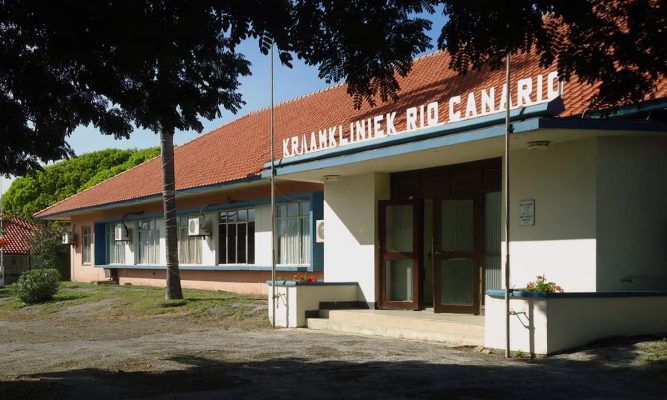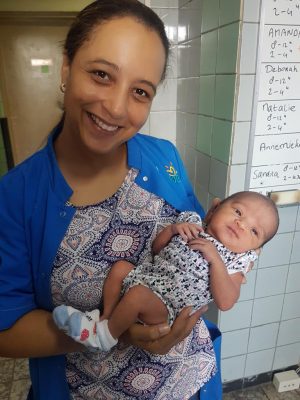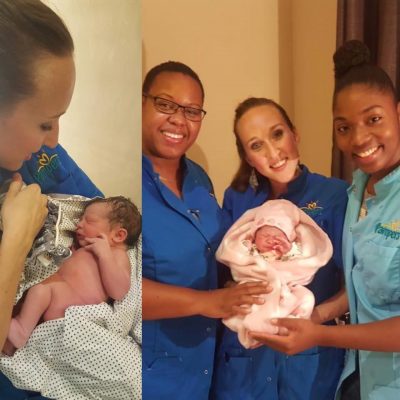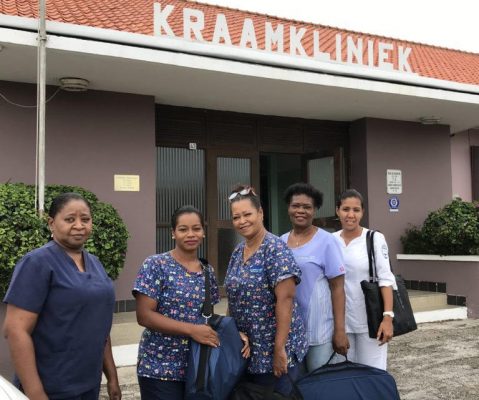No products in the cart.
Education, Interviews
MATERNITY CLINIC FUNDASHON DUNA LUS CURAÇAO, THE COMPLETE CARE CENTER FOR PREGNANCY, DELIVERY AND POSTPARTUM
Writer: Nathasja JT Plaizier
Pregnancy can bring a massive mix of emotions all at once, from joy, surprise, happiness to panic, anxiety, confusion, and the list goes on. All are normal and frightening at the same time. Knowing what to expect during the full term of pregnancy, before and after childbirth, is critical for monitoring the health of both the mother and baby. The maternity hospital Fundashon Duna Lus, “Kraamkliniek” as it is known on Curaçao, provides the complete care and necessary services from prenatal to postnatal for expecting mothers. To better understand the services and the clinic, we had the honor to speak with the Director Dr. G. Bryson, Head of Care Mrs. S. Adamus-Paz and one of the midwives Ms. A. Adriaansen.

Kraamkliniek, an overview
Bryson: Fundashon Duna Lus is the official name of the foundation, but everyone knows it as the maternity hospital “Kraamkliniek”.
Adamus: Fundashon Duna Lus was founded in 2006 by order of the government. Since the bankruptcy of the central district nursing fund, Fundashon Duna Lus has acted with the aim of creating an integrated maternity center. The care we provide is prenatal, natal, and postnatal. We have midwives, nurses, maternity assistants, and maternity care nurses who offer support to the mothers after the delivery for a 4-day period, usually between the 6th and 10th day after childbirth. When this period has ended, the mothers can come for a consultation and follow-up check with the midwives, which we call the walk-in office. At the start of the Fundashon, we did not yet employ midwives, which was new for a maternity center. The ultrasound procedures during pregnancy and deliveries take place in the main clinic, while the other locations have consultation and walk-in consultation hours for babies including check-ups.
Adriaansen: We offer all types of ultrasounds. The first ultrasound, the vitality ultrasound, is performed between 7-10 weeks, which is when the heartbeat is visible. At 10-13 weeks, we perform a term ultrasound when we measure the baby and determine the due date. During the term ultrasound, there is also an option to do a combination test, which is the screening for Down, Patau or Edward’s syndrome. At 16 weeks, there is the possibility to do a gender ultrasound. The 20-week structural ultrasound is performed to check all organs of the baby including its structural growth. If necessary, the gender is also determined if the parents have not performed a 16-week ultrasound. At 32-34 weeks, a growth ultrasound is standard to check that the baby is growing well. The vitality, term, structural and growth ultrasound are reimbursed by insurance providers. Beyond that, a family can choose additional extra ultrasounds plus can request for a 3D ultrasound, suggested between 26-34 weeks when the baby is more developed. During this ultrasound, the baby is examined for 30 minutes to an hour with nice pictures taken.

Coronavirus impact for Kraamkliniek
Bryson: Pregnant women need our services whether there is coronavirus or not. The biggest challenges have been the stricter measures necessary regarding COVID-19. We are extremely cautious to protect our clients and employees from any possible health threat. When the crisis started, we reduced operations to 50% occupancy due to the uncertainty of the situation. We were running at 50% in terms of staff with the intention if an infection were to occur, then the entire clinic would not have to be closed as we would have staff at home on reserve. Visiting hours have been adjusted, the household rules regarding entrance access have been tightened, we are administering questionnaires, and masks are mandatory. The measures surrounding coronavirus have of course been tightened up, as with every healthcare institution, so that we can keep the chance of contamination as small as possible.

Pregnancy courses
Adriaansen: Besides offering complete maternity care, another main objective is to provide as much information on pregnancy as possible. As we are limited in time during consultations, the pregnancy course was set up to offer more in-depth lessons and guide people throughout the pregnancy. We try to form groups with the same due date, and usually start when they are around 28-30 weeks pregnant. The course is meant for pregnant woman and her birth partner, who can be the father, a family member or friend and will be present during the delivery. The goal of the course is to explain to the mothers what to expect but also guide the birth partners of their role. We provide the practical information about pregnancy, giving birth and starting with a new baby in a pleasant and open atmosphere before the life changing experience of becoming a new parent.
The course is divided into several meetings before delivery. The first session begins with introductions and discussions about preparing for childbirth and the physical part of the labor. Topics are discussed such as what to pack and bring, how does your body prepare, what is normal/not normal. We provide breathing exercises for during labor, so that mothers can practice at home. The second session is about the delivery itself, the different types of contractions, understanding the stages of labor, how long it can take once the time has come, what will happen during delivery and as soon as the baby arrives. Then we bridge to the third meeting which focuses on the transition from pregnancy to caring for a newborn and how to handle the first hours, days, weeks and into parenting. During the fourth session, a maternity nurse will explain her role at home after childbirth and advanced courses at the clinic including additional support available such as baby massages and exercise programs for new mothers. The last session, before the expected childbirths, photos are taken, and then weeks later a reunion is scheduled for families with their newborns. The pregnancy course is open to everyone, not just clinic clients and provides a support group for families to share and discuss the experience.

Expectations for the future
Bryson: We are constantly developing and improving the clinic. Currently, one of our biggest challenges is our location and distance away from the hospital. We are now working on getting as close to the hospital as possible to better respond to any problems that could arise during delivery and if a client requires hospital facilities. Plus, we continue to build new locations for easy access for people. In the field of midwifery, we follow the guidelines in the Netherlands and stay progressive within primary care here on Curaçao. A year and a half ago, we introduced CTG (cardiotocography monitoring, widely used to assess fetal wellbeing). We also have new ideas for pain relief during labor, such as options for doing TENS (trans-electro-nerve stimulation), which can provide pain relief without the need for anesthesia. In these situations, an epidural injection is not necessary and means that women do not necessarily have to be admitted to the hospital during childbirth. These are developments that we are still working on, and hopefully can start them within a few months.
Adriaansen: Ideally, pregnant women will come to us immediately from the moment they know they are pregnant, and then we can support them completely during their pregnancy journey.
Tips for expectant mothers
– Schedule a visit with the clinic as soon as you know you are pregnant.
– Kraamkliniek is primary care, so no referral from the GP is required.
– As each situation is different, the doctor/midwife will help counsel on the best path to follow and schedule the necessary ultrasounds at the clinic.
– Kraamkliniek accepts SVB, Ennia, Fatum, Guardian Group, including personal reimbursement.
For more information on Fundashon Duna Lus Curaçao, visit https://kraamkliniekcuracao.com/



